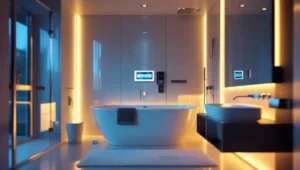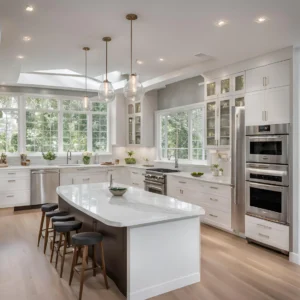Are you ready to elevate your bathroom experience while saving money in the long run? The bathroom is often overlooked when it comes to smart home upgrades, yet it’s a space where technology can significantly enhance comfort and efficiency.
Here are seven smart bathroom trends 2025 that not only modernize your space but also help you save on utility bills and improve your daily routine.
If you’re considering Bathroom Remodeling, integrating smart technology into your design can enhance both convenience and efficiency while increasing your home’s value.
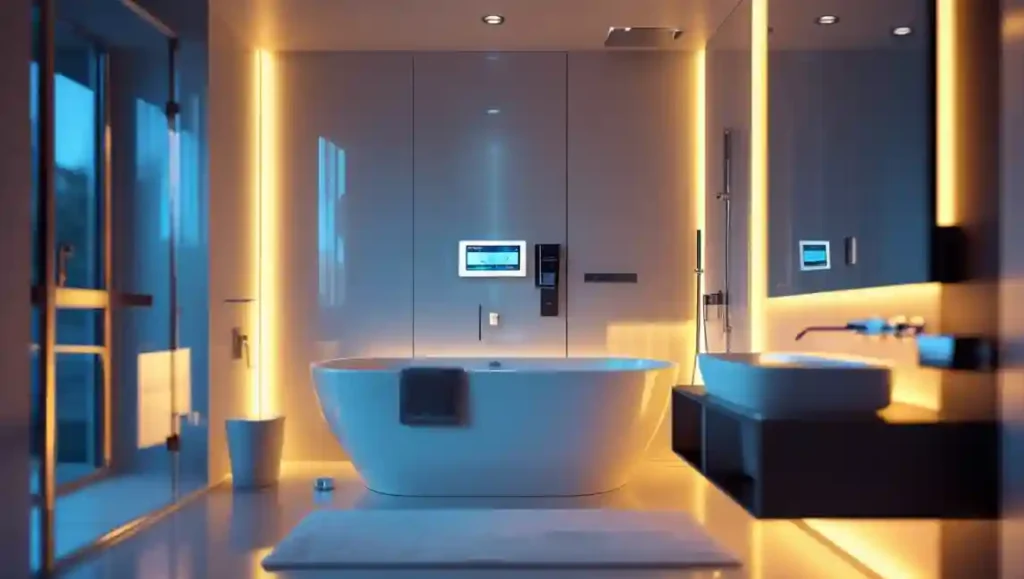
1. Smart Showers: Control at Your Fingertips
Imagine stepping into a perfectly heated shower every morning! Smart shower systems like the Moen U by Moen allow you to set your ideal water temperature and flow through an app. This not only saves water by preventing unnecessary wastage but also ensures a luxurious experience tailored to your preferences. By reducing water usage, you can see a noticeable decrease in your monthly water bill.
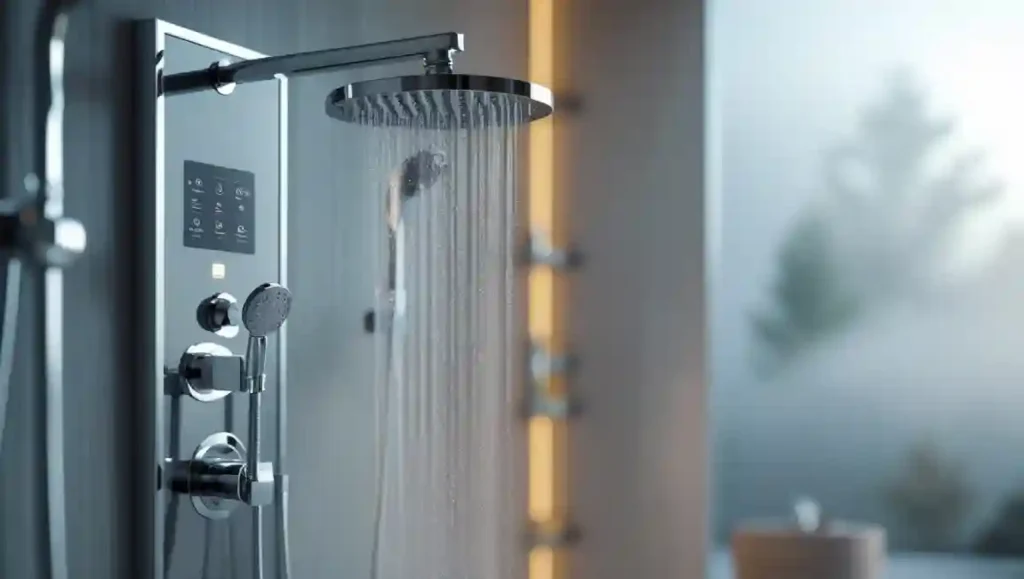
2. Intelligent Toilets: More Than Just comfort
Upgrade to an intelligent toilet, such as the TOTO Neorest, which offers features like automatic lid opening, heated seats, and built-in bidets. These toilets use less water per flush compared to traditional models and can reduce toilet paper usage by up to 80%. Not only do they provide superior hygiene, but they also lead to lower water and spending on supplies.
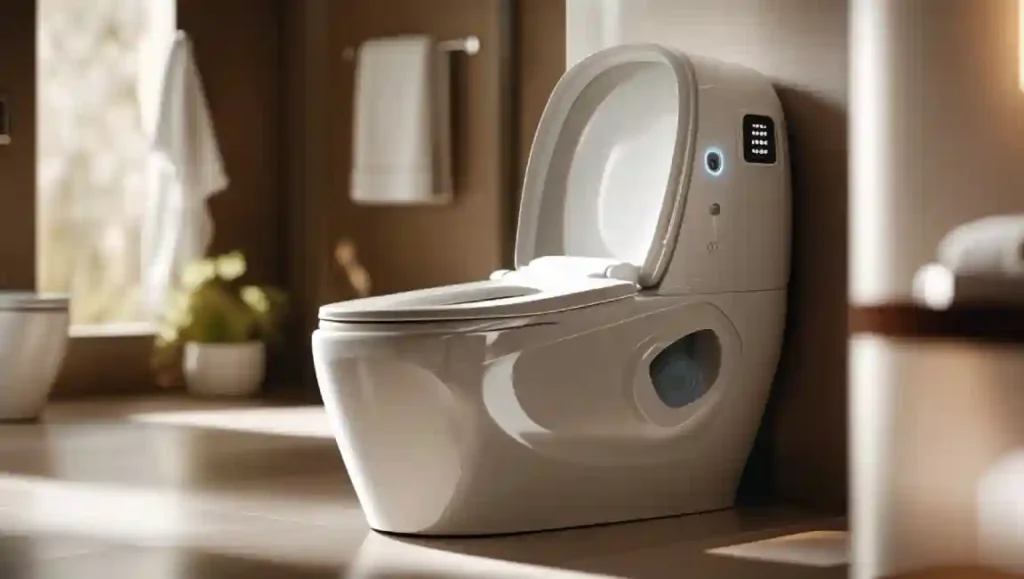
3. Smart Mirrors: Reflecting More Than Just Your Face
Smart mirrors come equipped with built-in lighting, touch controls, and even skin analysis technology. They allow you to adjust lighting to minimize energy consumption while providing a personalized skincare routine. With features that remind you when to replace products, these mirrors can help you save money on skincare by maximizing product efficiency.
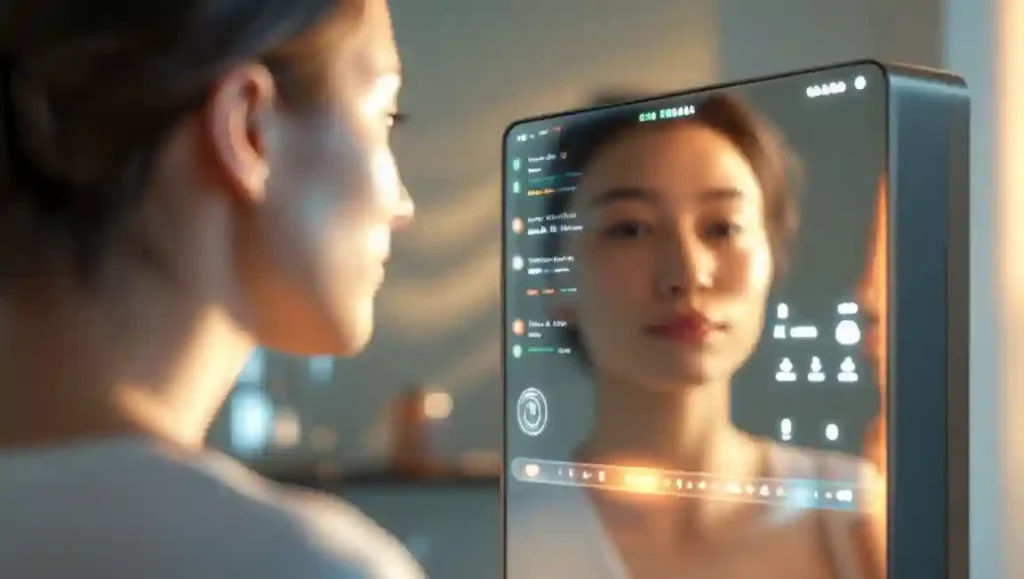
4. Water-Saving Smart faucets: Efficiency Meets Style
faucets with motion sensors not only eliminate the need for manual operation but also reduce water waste. By automatically turning off when not in use, these faucets can save up to 30% more water than conventional ones. Imagine the savings adding up on your water bill, all while enjoying a sleek and modern design.
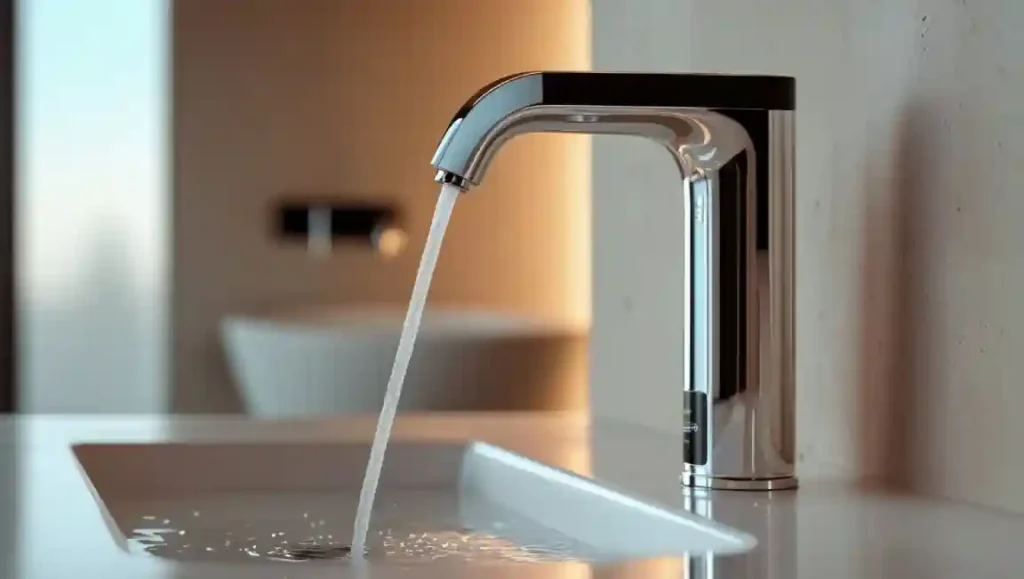
5. Smart Lighting: Illuminate with Intelligence
Install smart lighting systems to control your bathroom lights through your smartphone or voice commands. These systems allow you to set schedules and adjust brightness, significantly cutting down on energy usage. Using LED bulbs can further enhance savings, as they consume up to 75% less energy than traditional bulbs.
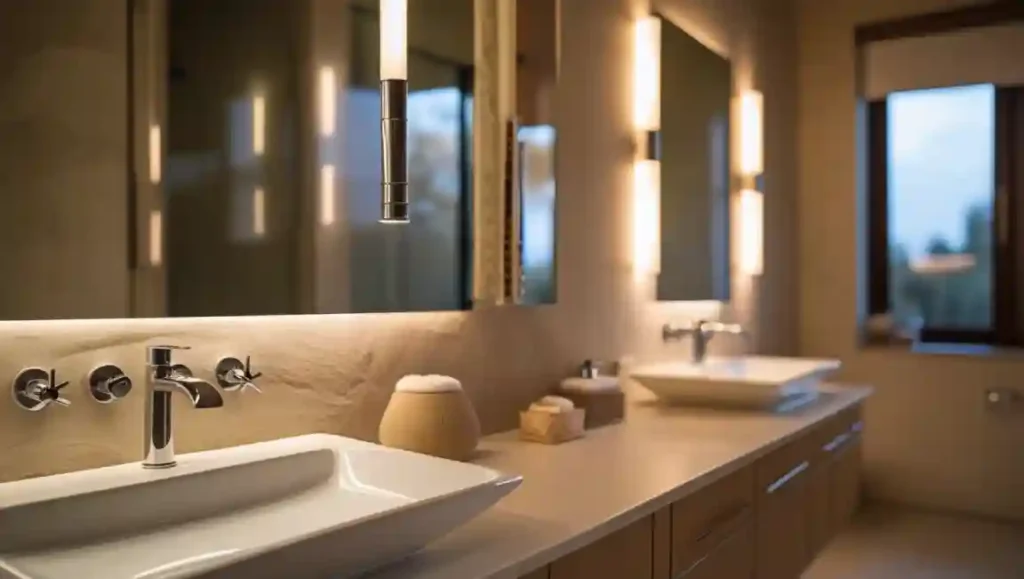
6. Leak Detection Systems: Prevent Costly Repairs
Invest in a leak detection system like the Phyn Plus, which monitors your plumbing and alerts you to leaks before they become major issues. Not only does this prevent water damage and costly repairs, but it can also save you money on your water bill by identifying and addressing leaks early on.
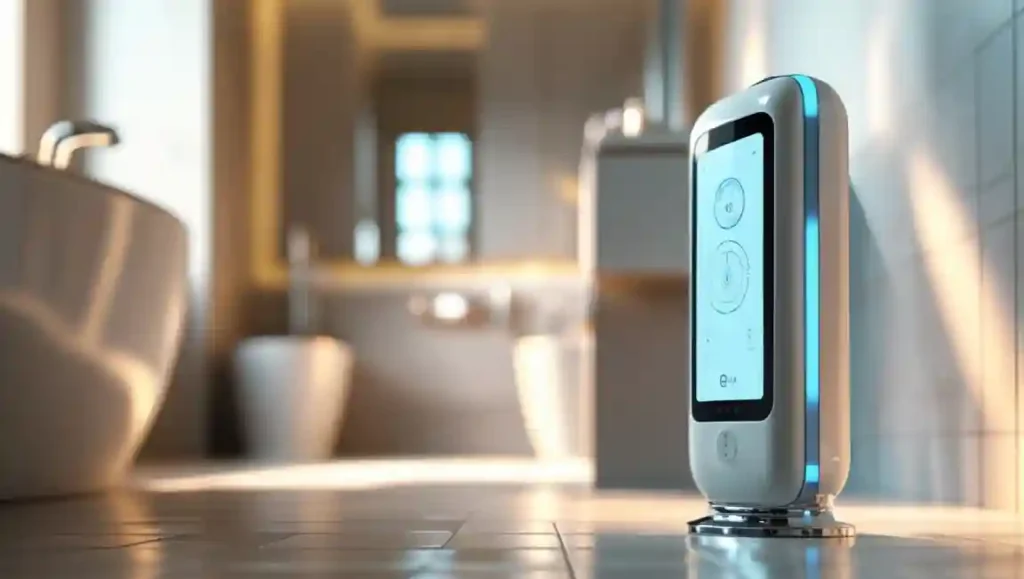
7. Smart Bath Accessories: Comfort Meets Technology
Consider smart bath accessories, such as heated towel racks that can be controlled via an app. These racks not only provide a luxurious experience but can also lower humidity levels in your bathroom, preventing mold growth and reducing the need for costly repairs. By keeping your towels warm and dry, you enhance your comfort while maintaining a healthier environment.
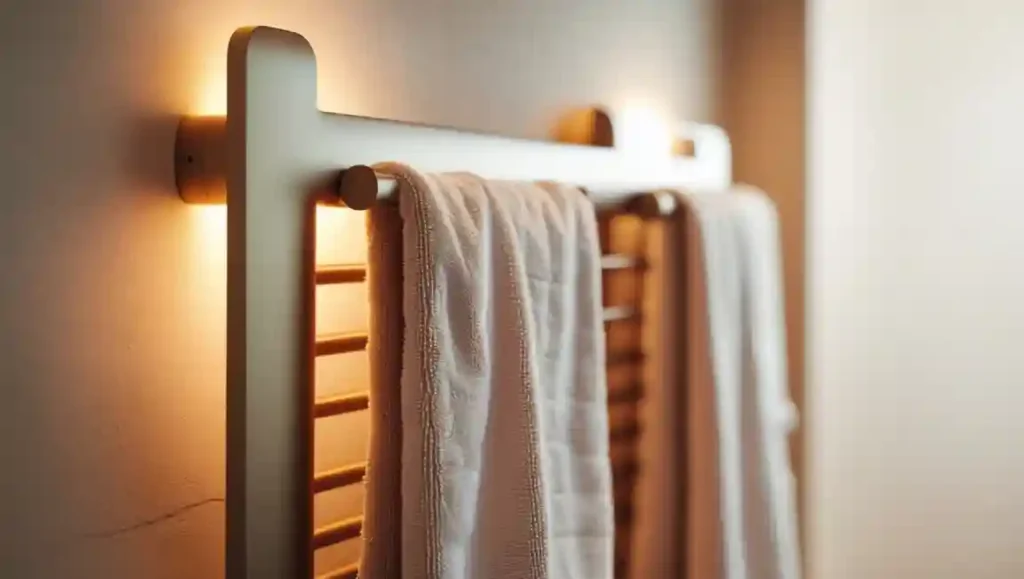
Embrace the Bathroom Trends 2025
These smart bathroom trends 2025 blend technology with sustainability, making your daily routines more enjoyable while saving you money. Whether it’s reducing water waste, cutting down on energy costs, or preventing damage, each upgrade offers unique benefits that shift your bathroom from a simple utility to a smart oasis. Embrace these innovations and experience the perfect balance of luxury, comfort, and savings in your home.
FAQs about bathroom trends 2025
In this section, we address some common questions regarding smart Bathroom trends 2025. From understanding the benefits of these technologies to practical considerations, we aim to provide clear and concise answers to help you make informed decisions about enhancing your bathroom.
1. What are smart bathroom upgrades?
Smart bathroom upgrades refer to modern technologies and devices designed to improve the functionality and efficiency of your bathroom. These upgrades can include intelligent toilets, smart mirrors, water-saving faucets, and more, all aimed at enhancing your daily routine while saving resources.
2. How do smart showers save water and energy?
Smart showers allow users to set precise water temperatures and flow rates through an app. By optimizing water usage and preventing unnecessary wastage, these systems can significantly reduce water consumption and energy costs associated with heating water, leading to lower utility bills.
3. Are intelligent toilets worth the investment?
Yes, intelligent toilets can provide numerous benefits, including enhanced hygiene, comfort, and water efficiency. They often use less water per flush compared to traditional toilets and can reduce the need for toilet paper, ultimately saving you money over time.
4. How can smart mirrors enhance my skincare routine?
Smart mirrors come equipped with features like built-in lighting and skin analysis technology. They help you optimize your skincare routine by providing personalized recommendations, tracking product usage, and reminding you when to replace items, ensuring you get the most out of your skincare products.
5. Do I need special installation for smart tap and fixtures?
Most smart faucets and fixtures are designed for easy installation and can be fitted into your existing plumbing setup. However, some systems may require professional installation for optimal performance, especially if they involve more complex features like sensors or connectivity.
6. How do leak detection systems work?
Leak detection systems use sensors to monitor your plumbing for signs of leaks. These systems can alert you to potential issues in real-time, allowing you to address them before they lead to significant water damage or costly repairs.
7. What are the energy savings from smart lighting systems?
Smart lighting systems, such as LED bulbs and smart switches, can reduce energy consumption by allowing you to control lighting schedules and brightness levels. Using LED technology alone can save up to 75% more energy compared to traditional bulbs, leading to lower electricity bills.

